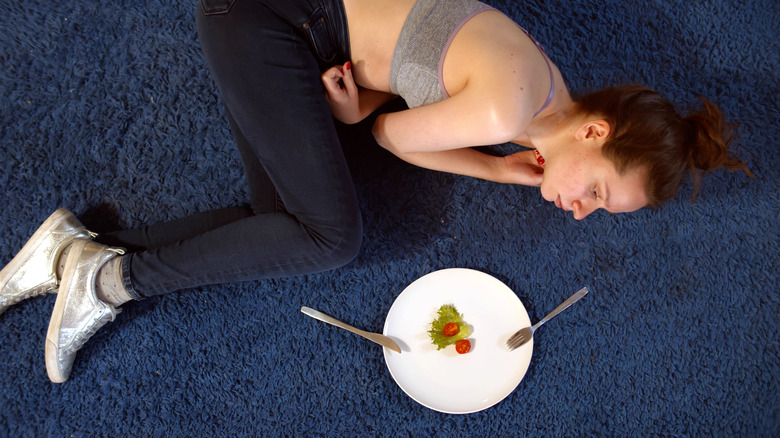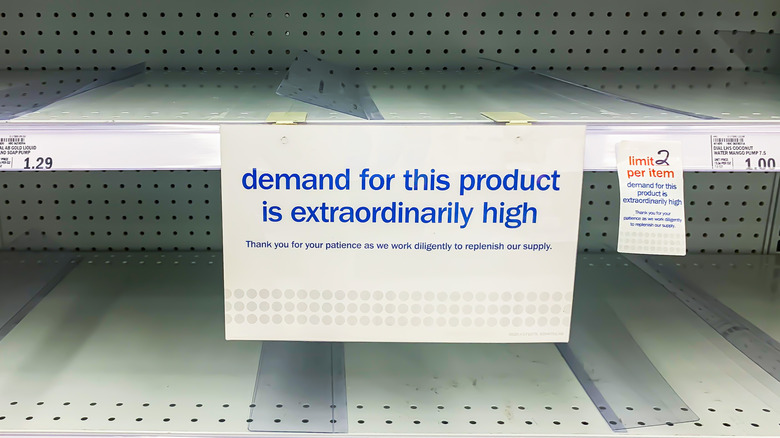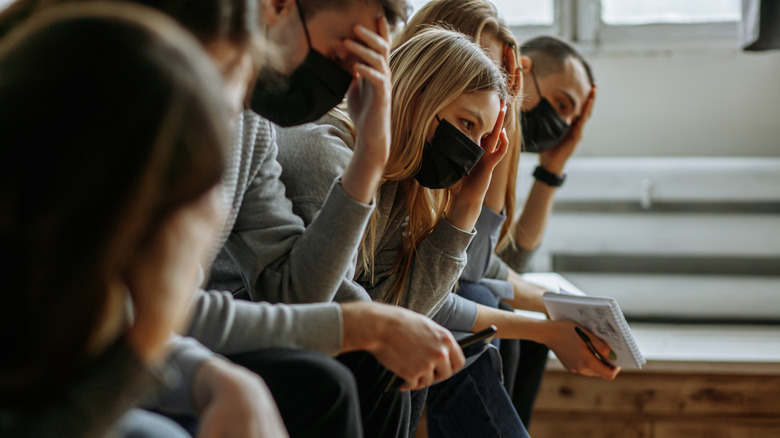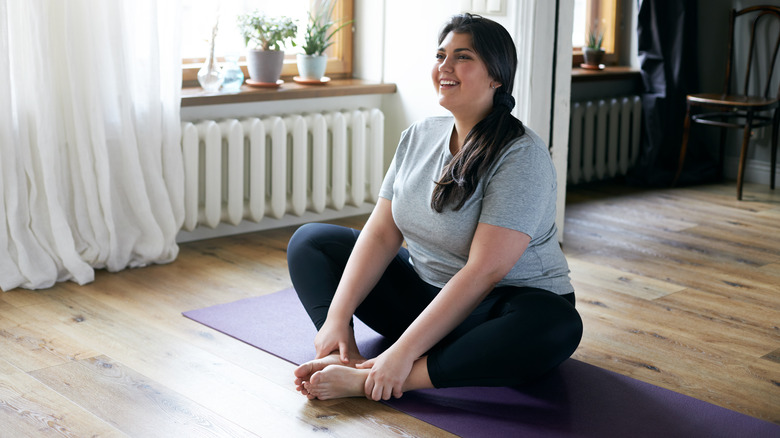The Real Reason COVID-19 Is So Bad For People Recovering From Eating Disorders
While COVID-19 has seriously impacted the health of millions of people worldwide and ended the lives of over 3 million to date (via Worldometer), it's also had a detrimental effect on the health of those who were spared the virus itself. People have been binging on unhealthy foods and delaying or skipping necessary health care procedures ranging from mammograms to trips to the dentist to those annual vision screenings kids get at school. Perhaps the most severe impact from the pandemic has been its effect on people's mental health. The stress has not only been causing rates of depression, anxiety, and substance abuse to spike, but has also been making it more difficult for people to get the help they need.
Kim Anderson, Ph.D., a regional clinical director with the Eating Recovery Center, acknowledges that "the COVID-19 pandemic has had profound effects on mental and physical health worldwide," but she is particularly concerned for one group of people. As she told The List, the pandemic "has created an unhealthy environment where eating disorder risk and symptoms are significantly increased." What's more, she says that access to care for those with eating disorders has decreased during this time, causing what she calls "a kind of a Catch-22 situation."
There's been a lot of anxiety around food
Eating disorders stem from the complex relationships people have with food, so any increased attention to this particular subject can be problematic. Last year, when first we became aware that the pandemic was going to affect us here in the U.S., one of the earliest ways our anxiety manifested itself involved running out and panic-buying groceries — either that, or desperately trying to book a grocery delivery time slot since we feared to leave the house. As Anderson points out, this heightened food anxiety was terrible for anyone with an eating disorder.
"First," Anderson told us, "increased anxiety in general can have a negative effect on eating disorder recovery." She went on to add, "Further, for these individuals, it may be viewed as a serious roadblock when food items needed for meal planning are out of stock." The fact that suddenly everybody on social media was constantly talking about food — getting it, hoarding it, cooking it, eating it — is something that Anderson said most likely "increase[d] the likelihood of binge eating." Then came the "quarantine 15" memes as well as a newfound obsession with virtual workouts, both of these things putting an unhealthy emphasis on promoting what Anderson calls "the thin ideal." As a result, she says, they "ha[d] a negative effect on people struggling to stay on track in recovery during this already stressful time."
Treatments have been disrupted
While staying home for a few months may have been necessary to slow the spread of the pandemic, there's no denying our nationwide lockdown had a serious downside. Anyone with an eating disorder (or any other condition) may have hesitated to seek treatment out of fear of contracting the COVID virus at a doctor's office. This meant, Anderson tells us, that "patients were getting a lot sicker before getting any help."
Even those who were already in therapy may have experienced some difficulties. As Anderson explains, "During treatment for an eating disorder, establishing structure around meals and activities is an important intervention that helps support the recovery process." With social distancing and all of the upheaval that entailed such as working and schooling from home, daily routines were often disrupted.
This "abrupt reduction in structure," as Anderson described it, "created unstable eating, sleeping, and exercising patterns often leading to increased eating disorder behaviors." What's more, she also shared the fact that "eating disorders thrive in isolation and secrecy," and says that the isolation many experienced when deprived of the company of friends and family meant that they no longer had support with managing their eating disorders.
Self-care is a must
If you are dealing with an eating disorder, Anderson strongly urges that you seek professional help. She notes that there are many more options these days for virtual care, calling it "a silver lining of the pandemic." Even if you can't afford to pay for therapy, she says Eating Recovery Center now offers 18 free support groups aimed at different audiences, and also recommends the free resources offered by the National Association of Anorexia Nervosa and Associated Disorders (ANAD) and other nonprofits.
You may even find help from talking to a non-professional such as a friend, family member, or anyone else you trust. If eating alone is a problem, Anderson suggests making Zoom meal dates. She also advises "creat[ing] a daily structure for yourself around meals," as well as trying to schedule enough sleep and some time for stress-busting activities such as spending time outdoors.
Although she advocates regular mealtimes, she does say it might do you good to try to be a bit more flexible with the menu, citing studies that indicate "more variety in meals and diversity of foods is a predictor of positive outcomes in long-term recovery from eating disorders." Oh, and one more thing you should do — in fact, something we should all do — is to detox from social media! If you can't give up the 'gram (or the twits), you should at least try, as Anderson advises, to "exclude negative posts and instead follow supportive, body positive messages."



